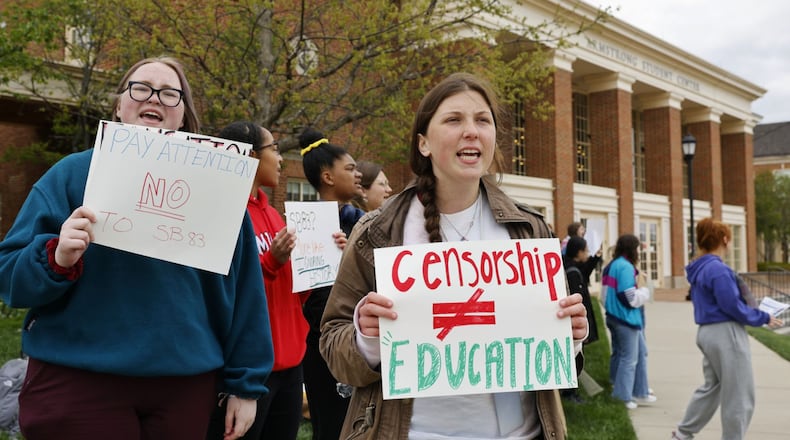The bill says colleges can’t publicly take a position on climate policies, electoral politics, foreign policy, diversity, equity, and inclusion programs, immigration policy, marriage, abortion, or other controversial policies, as defined by the state.
That’s the key phrase, “as defined by the state.” Lawmakers want to tell you what’s controversial, meaning they’re engaging in some sort of Orwellian thought control (I guess lawmakers haven’t read Healy vs. James, the 1972 Supreme Court ruling that codified free speech rights for public universities).
The bill would prohibit university staff from striking, depriving workers of their only effective tool to battle for better working conditions.
The bill requires students to take an American history course as defined by lawmakers without meaningful experience in developing college curricula beyond their own ideology.
The bill would also create “intellectual diversity centers” at Toledo and Ohio State Universities, a blatantly dishonest description since the bill’s sponsor says this is about countering what he calls liberal bias on college campuses.
“Conservatives are political minorities on woke campuses,” Sen. Jerry Cirino (R-Kirkland), the bill’s sponsor, wrote in an April 3 opinion piece. “They are treated unequally and can face punishing censorship. Just like racial discrimination, this is unfair and irrational. It robs students of their equal rights. A uniformly leftist agenda on campus also replaces education with politically correct indoctrination.”
Let’s review. We know that the GOP doesn’t want to hear that most Americans believe DEI programs (56%) have value, compared to the small minority (18%) who don’t. The party is tired of hearing that most Ohioans (59%) believe in women’s right to choose. They also don’t want to hear that 69% of Americans want the country to move to a carbon-neutral footprint by 2025. These numbers come from Pew Research and Baldwin Wallace University.
How do you suppress opposition? By prohibiting speech and creating ideological safe havens for certain beliefs.
Bill supporters correctly say that the bill doesn’t say “conservative” or “liberal” and simply seeks diversity of views on college campuses. But there isn’t one shred of nonpartisan evidence showing colleges have shunned conservative views and demonized students who hold them. In his op-ed, Cirino points to an opinion piece out of London as evidence of anti-conservative bias.
Yes, you can find many polls that note conservatives believe they’re being discriminated against because of their views, like this one by Pew. But there’s a difference between belief and truth.
Yes, it’s true that relatively few college administrators (6%) and instructors (12%) identify as conservative or far right, according to a compendium of research by the nonpartisan Heterodox Academy. But using that disparity as evidence of intellectual bias would be as ludicrous as saying a company with 80% white employees must be inherently biased.
Practically speaking, instructors don’t tell students what to think and discourage debate, regardless of point of view. Instructors realize rigorous classroom debate and encouraging different points of view are at the center of preparing students to critically understand issues from all ideological points of view.
In Columbus, lawmakers want college students, whom polls show are becoming increasingly liberal, to latch on to a specific ideology.
Theirs.
Ray Marcano’s column appears on these pages each week. He can be reached at raymarcanoddn@gmail.com.

